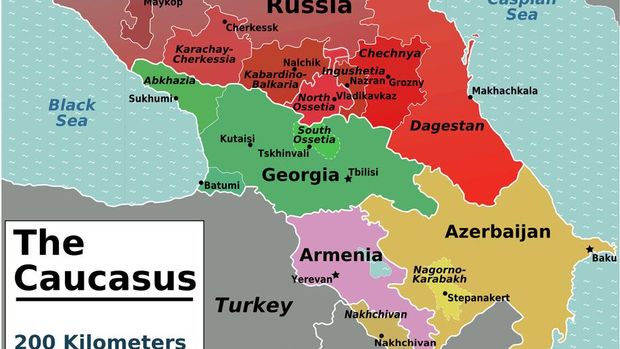 With Moscow accused of all manner of sinister shenanigans on the global stage, calls are mounting for a boycott of the World Cup, which is scheduled to be held in Russia this summer. Among the cases drawing special ire from rights groups is that of the leading human rights activist in Chechnya—now imprisoned on a "blatantly fabricated" cannabis charge.
With Moscow accused of all manner of sinister shenanigans on the global stage, calls are mounting for a boycott of the World Cup, which is scheduled to be held in Russia this summer. Among the cases drawing special ire from rights groups is that of the leading human rights activist in Chechnya—now imprisoned on a "blatantly fabricated" cannabis charge.
The list of outrages against the Russian government at this moment is pretty long—the probable meddling in the 2016 US election, the poisoning death of a former KGB agent in England, and Moscow's involvement in the wars n Ukraine and Syria. Adding to all this is a particularly egregious cannabis case in Russia's southern republic of Chechnya.
It's mostly the slaying of the ex-KGB man Sergei Skripal that has led to widespread calls for a boycott of the upcoming 2018 World Cup, set to open in Russia this June. The call has reached other nations too; Australia is considering a boycott, and (not surprisingly) Ukraine's government openly advocating one.
But some are also calling for pressure on the International Federation of Associated Football (FIFA) over the imprisonment of Oyub Titiev, the leading human rights activist in Chechnya, who was arrested on cannabis charges in January and faces years in prison.
Even within the increasingly authoritarian Russia of Vladimir Putin, Chechnya is a harshly closed place, with the republic's President Ramzan Kadyrov running what critics call a "totalitarian state within a state." Titiev's arrest came amid a draconian anti-drug crackdown in Chechnya, which was one of the things he'd been protesting—along with the internment of gay men in detainment camps.
At the time of his arrest, Human Rights Watch called the charges against Titiev "blatantly fabricated," and expressed fears for his safety—noting the many threats and attacks on members of his rights organization, Memorial (the only one actually functioning in Chechnya). Titiev assumed leadership of Memorial after the 2009 abduction and assassination of its then-leader, Natalia Estemirova.
Police said they found 180 grams of cannabis during a search of Titiev's car on Jan. 9. Just a week after his arrest, masked assailants staged an arson attack on Memorial's local office in the neighboring republic of Ingushetia.
HRW's director for Europe and Central Asia, Rachel Denber, in March traveled to Chechnya to attend a court hearing in which Titiev appealed the extension of his pre-trial custody. His appeal was, predictably, turned down. In her write-up on the hearing, Denber also noted that the judge rejected the defense’s motion to allow Titiev to sit with his lawyers instead of in the dehumanizing defendants’ “cage.”
Grozny, Chechnya's capital, is slated to host the Egyptian national football team during the World Cup. And as Denber reminds us, FIFA has just instated a vigorous new human rights policy (PDF), that supposedly applies to all its operations. She writes: "One way to put this policy into practice, and address the unjust and unseemly juxtaposition of Titiev in jail and FIFA enjoying the embrace of Kadyrov, would be for them speak up for Titiev at the highest level and seek his release."
Meanwhile, things only seem to be getting worse. Just days after Titiev's hearing, Amnesty International reported the brutal assault on Sirazhutdin Datsiev, the head of Memorial’s office in Dagestan, another republic bordering Chechnya. Datsiev was attacked from behind outside his home in Dagestan's capital Makhachkala. The assailant delivered a severe blow to his head and then kicked him once he was on the ground. Datsiev was hospitalized, and is still recovering.
And this month, Amnesty noted the one-year anniversary of the "gay purge" in Chechnya, in which dozens of men were abducted, tortured and killed by authorities. To date, not one person has been held to account for these crimes. "We have witnessed a shocking display of denial, evasion and inaction by the authorities, who have repeatedly refused to launch an official investigation into the reported heinous crimes," said Amnesty's Denis Krivosheev.
In fact, the "gay purge" has only been augmented with a similar wave of arbitrary arrests and torture of suspected drug users, as The Independent reported in January. Titiev's case is pretty clear evidence that this grim crackdown is really aimed as suppressing opposition.
Nor is this the first time Kadyrov's machine has used Chechnya's unforgiving cannabis laws in an apparent bid to squelch internal dissent. In a profile of the Chechen police state, rights advocacy website openDemocracy recalls the case of Jalaudi Geriyev, a young journalist working for the liberal Caucasian Knot online news site who was arrested for supposedly smoking hashish in a Grozny cemetery in April 2016. After being tortured in custody, he was convicted of cannabis possession and sentenced to three years in a prison camp. Prosecutors actually contradicted themselves about whether the packet of hashish was found in his backpack at the time of his arrest or in a subsequent search of his apartment. He remains at forced labor in a prison colony.
Cross-post to Cannabis Now
Map: WikiMedia







Recent comments
3 weeks 1 day ago
3 weeks 1 day ago
6 weeks 2 days ago
7 weeks 1 day ago
11 weeks 2 days ago
15 weeks 13 hours ago
19 weeks 19 hours ago
19 weeks 6 days ago
29 weeks 6 days ago
33 weeks 6 days ago